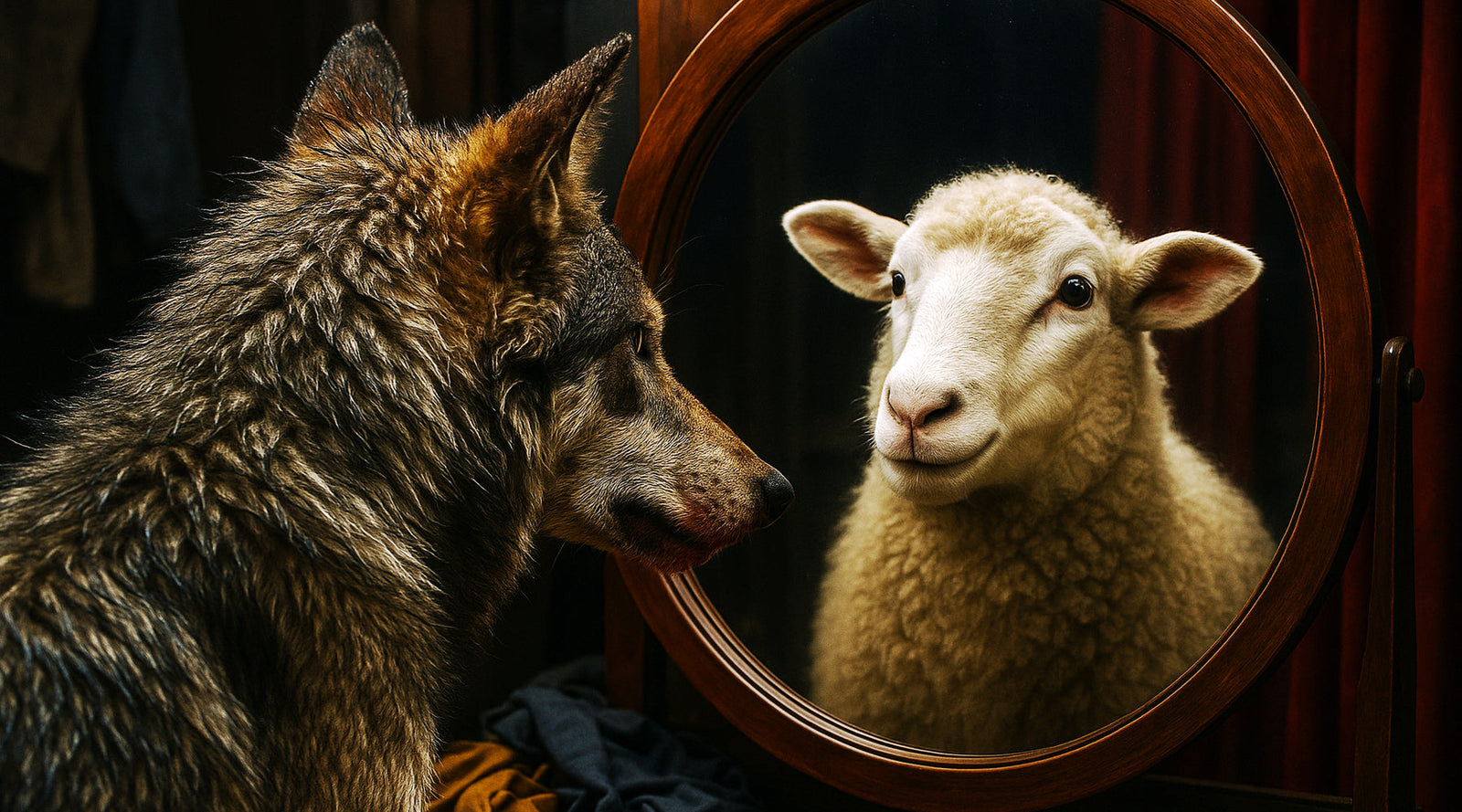Listen to this article
“Beware of false prophets who come to you in sheep's clothing but inwardly they are ravenous wolves.” — Matthew 7:15
In the soft glow of twilight, when the world feels quiet and reflective, we tend to imagine evil as something external—something out there. It’s the stranger in the alleyway, the cult leader in a compound, the televangelist with a gold-plated smile and a platinum jet. But rarely do we look in the mirror and wonder if the wolf is sometimes staring back at us through our own pupils, pacing in our own hearts, tucked away beneath curated kindness and Sunday-best smiles.
Jesus’ warning in Matthew 7:15 is not simply a call to protect the flock—it is a call to interrogate the self. Because sometimes, the fangs are beneath our own fleece.
We are creatures of contradiction, aren’t we? Both beast and beauty, broken and beloved. In our hunger to belong, we slip on sheep’s clothing with alarming ease. We mimic manners, adopt accents, quote scripture like song lyrics we don’t live, and in doing so, deceive others—and more tragically, deceive ourselves.
But make no mistake: wolves are not always malicious. Sometimes, they’re merely misunderstood. Sometimes, we become the predator because we’re trying not to be the prey. In this wounded world, survival often demands disguise. We wear ambition like armor. We weaponize charm. We masquerade our malice in the name of being liked, or loved, or left alone. But wolves, even when well-dressed, always hunger. And hunger exposes.
In the age of Instagram filters and TikTok theology, authenticity has become a revolutionary act. We scroll through curated Christianity: latte devotionals, aesthetic prayers, influencer faith wrapped in pastel presets. But behind the pixels, the questions loom: Who are we really? Are we who we say we are? Or are we expertly edited avatars of our aspirations?
Matthew 7:15 slices through the spectacle like a scalpel. It is not a polite verse. It is not nice. It is truth with teeth.
We tend to fear the wolf without, but Jesus urges us to examine the wolf within. Not just the false prophet in the pulpit, but the false persona in the pew. The wolf is the whisper that tells you your sin isn’t that bad, that confession is weakness, that honesty is overrated. It’s the pride that puts on piety like a pageant crown.
It’s easy to play the sheep. To learn the language, to blend with the herd. But what separates the sheep from the wolf is not the fleece—it’s the fruit. Jesus goes on to say, "By their fruit you will recognize them." Not their flair. Not their following. Not even their sermons or their Spotify devotionals. Fruit. The soul’s sustenance, grown in secret, born of repentance.
And here’s the brutal beauty of grace: We are all wolves masquerading as sheep until we collapse in front of the Shepherd. Until we admit our duplicity. Until we lay our masks at the feet of mercy.
The wolf in me lies. The wolf in me manipulates. The wolf in me smiles with insincerity, flatters for gain, hoards attention. But the sheep in me longs for the voice of the Shepherd—the voice that says, "You are not your secrets. You are not your schemes. You are not beyond saving."
In literature and lore, wolves have always represented wildness, cunning, danger. But in God’s story, even the wild can be redeemed. Saul was a wolf. Peter was a wolf. You and I, too, bite when we should bless. But when Christ calls us, He doesn't call our masks—He calls our name. And in His name, the predator is pacified. The beast bows.
To deny that we sin is to sin even more grotesquely. It is to declare ourselves divine. It is to dethrone the need for a Savior. When we pretend we are perfect, we reject the very reason Christ hung on a cross and cried, "Forgive them."
In the realm of rockstars and rappers, superheroes and scandals, we idolize the image and vilify the honest. But truth, raw and reverent, has never been trendy. Confession is not fashionable. Vulnerability is not viral. But it is vital. The Church isn’t a catwalk—it’s a triage tent for bleeding souls, some still baring teeth, others learning how to bleat.
There’s a haunting line in the movie The Dark Knight: "You either die a hero or live long enough to see yourself become the villain." Christianity flips this trope. In Christ, we live long enough to see ourselves as the villain—and yet He dies the hero. For us. Instead of us.
The world tells us to hide our flaws, to Photoshop our hearts. But Jesus calls us to confess, to be exposed and embraced. He doesn’t demand a cleaned-up version of you—He wants the truth, no matter how tangled. His light doesn’t shame; it sanctifies.
So take off the wool. Show your scars. Let the wolf fall to its knees.
We are not saved by pretending to be sheep. We are saved by the Shepherd who laid down His life for both sheep and wolves alike.
And the next time you look in the mirror and see the snarl behind the smile, remember: grace isn’t just for the innocent. It’s for the imposter. It’s for you.
Wolves beware. The Shepherd sees all. And still, He calls your name.
Wearing Your Faith Starts Here — Explore Faith Mode’s Bold, Christ-Centered Apparel Now!


